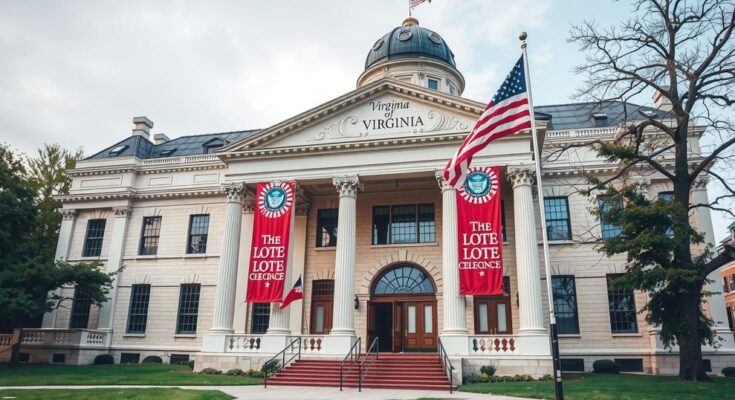Virginia’s upcoming special elections will determine control of the Statehouse, as two Senate and one House seat are contested e. Key candidates include Democrats Kannan Srinivasan, JJ Singh, and Jack Trammell against Republicans Tumay Harding, Ram Venkatachalam, and Luther Cifers. The elections are seen as reflections of voter sentiment following recent Democratic losses in the federal elections.
On Tuesday, Virginia voters will participate in pivotal special elections to fill critical vacancies in the state Senate and the House of Delegates. These elections occur in the wake of recent Democratic losses and will determine the balance of power in Virginia’s Statehouse, particularly during the final year of Republican Governor Glenn Youngkin’s administration. In Loudoun County, Republican Tumay Harding faces off against Democrat Del. Kannan Srinivasan to fill the Senate seat left vacant by Srinivasan’s election to Congress. Concurrently, the House of Delegates seat formerly occupied by Srinivasan is contested between Democrat JJ Singh and Republican Ram Venkatachalam.
In Goochland County, Republican Luther Cifers is competing against Democrat Jack Trammell for another Senate seat, a position recently vacated by U.S. Rep. John McGuire. This race draws attention not only for its local implications but also its significance in reflecting voter sentiment following the November presidential elections. With a narrow 20-18 majority in the Senate and a 50-49 lead in the House, each election is critical for Democrats aiming to maintain control amidst altered political landscapes.
Srinivasan and Singh emphasize their commitment to abortion rights, mirroring the Democratic Party’s initiatives to solidify constitutional protections in Virginia. Conversely, Harding and Venkatachalam advocate for conservative values centered around parental rights, crime reduction, and economic resilience. Each candidate articulates their vision through the lens of local concerns, with Cifers expressing a desire to uphold constitutional integrity while advocating for economic growth.
Trammell’s campaign seeks to challenge the Republican dominance in what he views as an evolving district that requires representation reflective of its present demographic realities. The outcomes of these special elections are not only vital for the immediate political landscape but will also serve as an indicator of the prevailing sentiments among Virginia’s electorate.
The significance of this electoral process underscores the growing need for responsive and representative governance as both parties navigate the complexities of constituent needs and policy priorities in a shifting political environment.
Virginia’s political landscape is currently marked by a fragile balance between the two major parties, particularly in the statehouse where Democratic and Republican control hangs in the balance. The special elections scheduled to take place are critical not just for filling vacancies but also for determining the legislative agenda in the Statehouse. With the Democratic Party experiencing setbacks in previous elections, the outcome of these elections may play a key role in shaping future policies around sensitive issues such as abortion rights and local economic factors. As such, these elections are being monitored closely as indicators of voter sentiment and party viability in the wake of recent defeats.
In summary, the upcoming special elections in Virginia represent a crucial moment for both major political parties, with implications that extend beyond local governance. The outcomes will determine control of the state legislature as Democrat candidates focus on maintaining momentum on key issues such as reproductive rights, while Republican candidates highlight economic and community concerns. As voters head to the polls, the results may provide significant insights into broader trends within the electorate, potentially reshaping political dynamics in Virginia for years to come.
Original Source: abcnews.go.com




